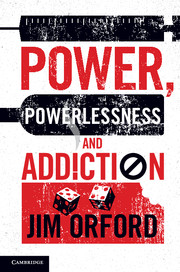Book contents
- Frontmatter
- Dedication
- Contents
- Preface
- Acknowledgements
- 1 Powerful connections
- 2 How addiction erodes free agency
- 3 Addiction subordinates the interests of family members and friends
- 4 Inequality in the power to resist addiction
- 5 Power and powerlessness in the addiction supply industries
- 6 Reasserting control and power in the process of change and treatment
- 7 Facing up to the power of addiction and those who benefit from it
- References
- Index
3 - Addiction subordinates the interests of family members and friends
Published online by Cambridge University Press: 05 July 2013
- Frontmatter
- Dedication
- Contents
- Preface
- Acknowledgements
- 1 Powerful connections
- 2 How addiction erodes free agency
- 3 Addiction subordinates the interests of family members and friends
- 4 Inequality in the power to resist addiction
- 5 Power and powerlessness in the addiction supply industries
- 6 Reasserting control and power in the process of change and treatment
- 7 Facing up to the power of addiction and those who benefit from it
- References
- Index
Summary
Powerlessness, which is so central to the idea of addiction that I am proposing in this book, radiates outwards, impacting those who are most closely connected. In the case of David – one of the three hypothetical cases introduced in Chapter 1 − it is his wife, Marian, who bears the full brunt of this disempowerment at second-hand, along with their three children, parents, brothers and sisters and close family friends. In Amanda's case it is her parents who feel mostly keenly the erosion of control over their lives, as do Amanda's brother and sister and other family members and friends. With Caroline it is her daughter, Karen, and brother, John, who are most affected. Like the other more than 100 million people world-wide who are affected by the addiction problem of someone they live with or are very close to – the number is certainly colossal but only a very rough estimate is possible – they experience a range of uncomfortable feelings as they witness the hold over their relatives exerted by the addictive substance or activity and its power to undermine their own interests. In the course of research by the group that I am part of, in which approaching a thousand affected family members have been interviewed in a number of different socio-cultural groups in four different countries, family members have told us repeatedly how it has made them anxious, depressed and angry. They talk about being worried, preoccupied with thinking about the relative and the problem, feeling nervous and panicky, irritable and quick tempered, low and miserable, annoyed and resentful. They use expressions such as, ‘wrung out’, ‘plays on your mind’, ‘nerves in pieces’, ‘on tenterhooks’, ‘dragged down’, ‘energy level and stamina low’, ‘cheated’, ‘let down’, ‘feelings of love and hate’. It is common for affected family members to feel a failure themselves or devalued. Some say they feel alone in facing the problem. Others feel frightened. It is not at all uncommon to hear thoughts of suicide expressed. It is hard to think of anything much more demoralising than witnessing at close hand a person you love, whose life is closely entwined with your own, and who you know is capable of many good things in his or her life, apparently being taken over by a seemingly senseless attachment to such a harmful form of consumption.
- Type
- Chapter
- Information
- Power, Powerlessness and Addiction , pp. 69 - 97Publisher: Cambridge University PressPrint publication year: 2013



